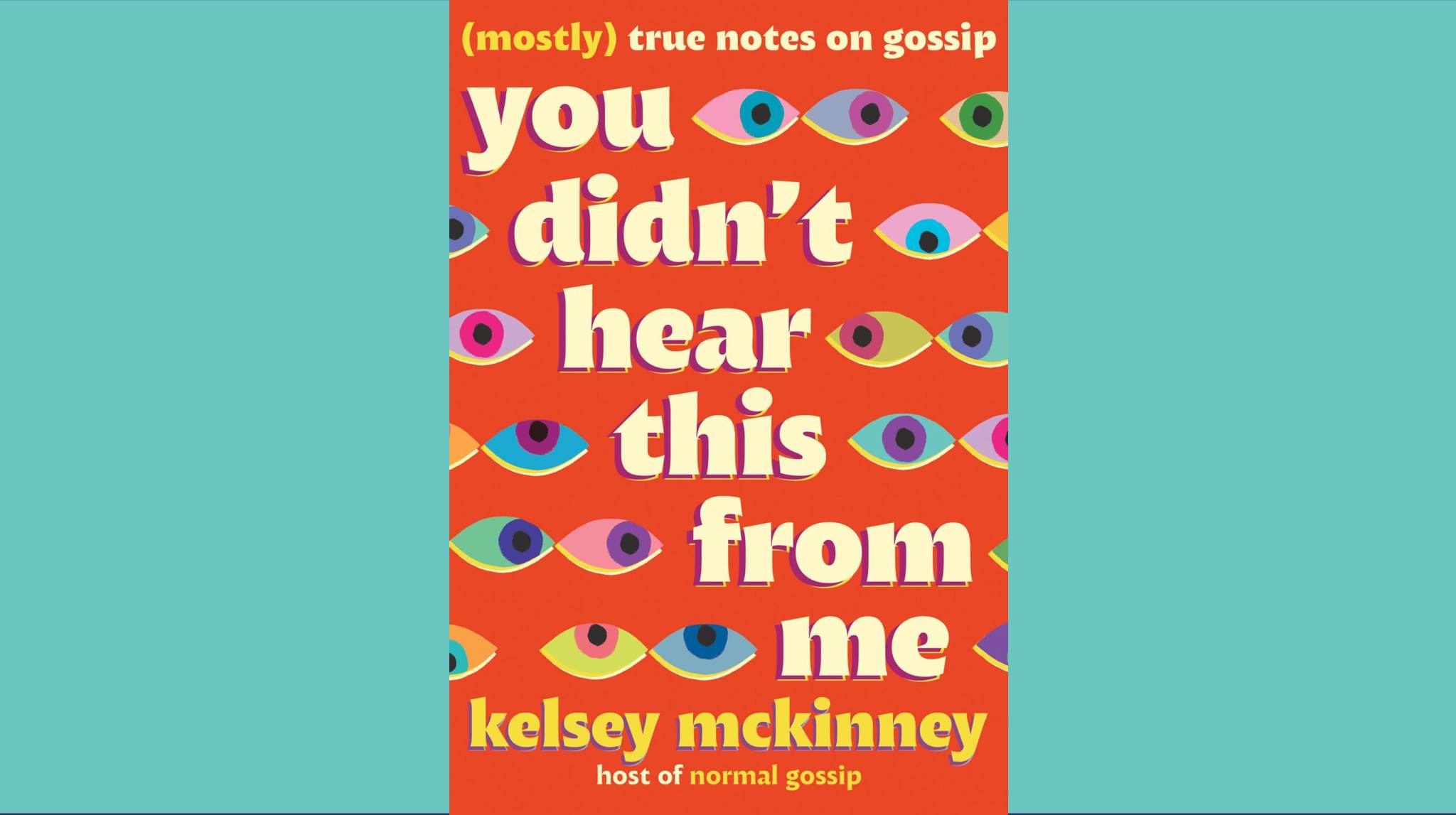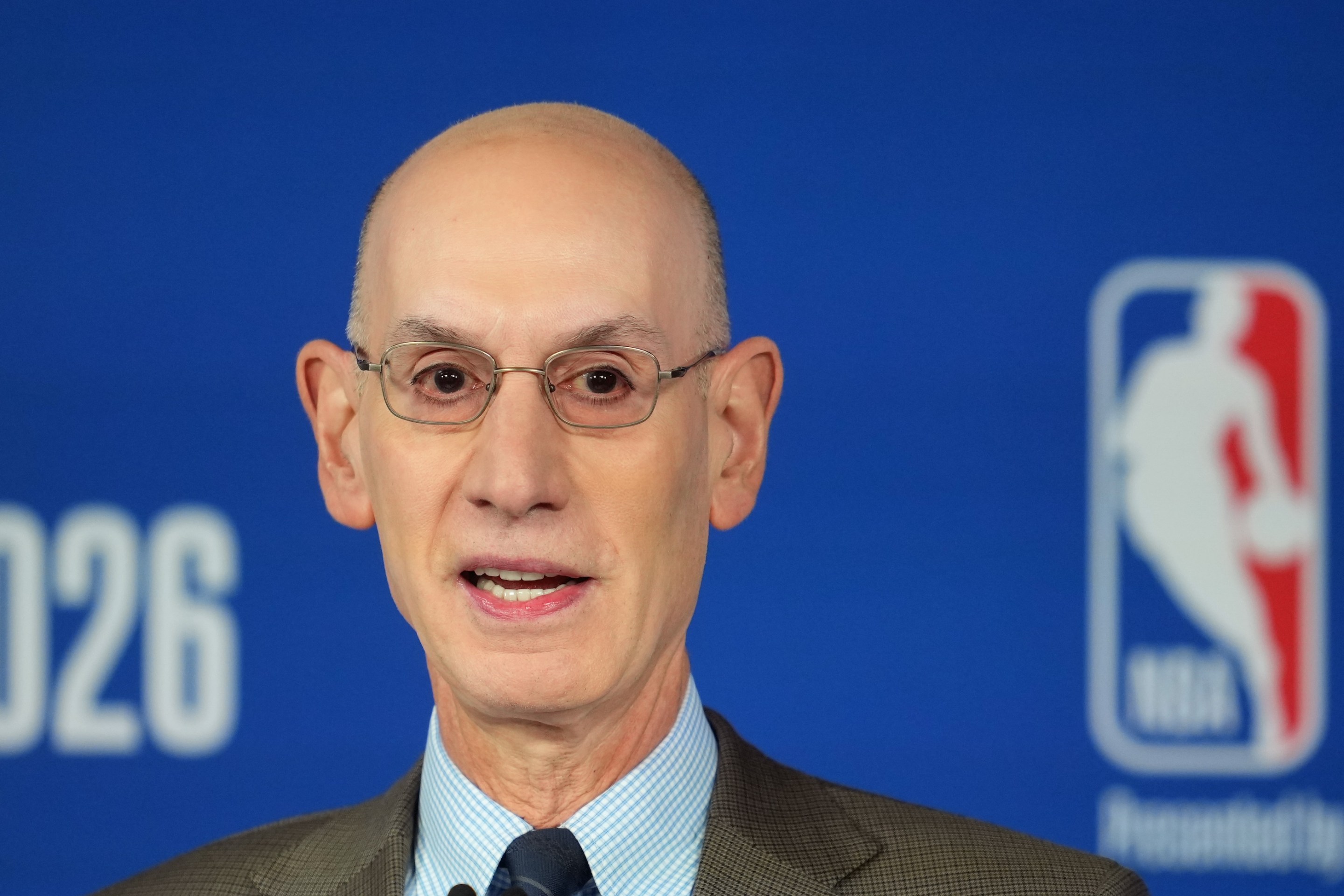When our brilliant, inquisitive colleague Kelsey McKinney last participated in the Defector staff author interview series, she was here as a novelist. Her debut, God Spare The Girls, came out in 2021. In those pages, you can already sense her interest in rumors and secrets, the way they structure our communities. Six months later, she and Alex Sujong Laughlin dropped the first episode of Normal Gossip, the instant mega-hit podcast serving up “juicy, strange, funny, and utterly banal gossip about people you'll never know and never meet.” After seven seasons, Kelsey and Alex have left the show in the hands of an amazing new host-producer duo in Rachelle Hampton and Se'era Spragley Ricks, but Kelsey has distilled all the years she’s spent telling, listening to and thinking about gossip into a new book, You Didn’t Hear This From Me: (Mostly) True Notes On Gossip, which is out today.
“At its most basic, gossip is just one person talking to another about someone who isn’t present,” Kelsey writes. She swallows up all these disparate categories of story—rumor, conspiracy, legend—and cleverly digests them. In some essays, she re-examines familiar places to see how gossip functions—in religious communities, on reality TV sets. In others, she’s concerned with the systems that accelerate gossip, like the norms of the internet and the anatomy of the ear. By the time you finish this book, you will have traveled in so many strange and enriching directions. Take this sampling from the "D" section of the index: defamation; Deuxmoi; Diana, Princess of Wales; Dickinson, Emily; Disney, Walt; Doja Cat; Donegan, Moira; dopamine; Dostoevsky, Fyodor; drag queen terminology.
In the headline of our last interview, Kelsey was jokingly called a "HOTSHOT Debut Novelist." The joke's on us now: As she sets off on her FANCY book tour—which you should attend, if you can even snag a ticket!—Kelsey is undoubtedly and unironically a hotshot. Still, she is kind enough not to forget the little people. On the morning of Kelsey’s publication day, we chatted about everything she learned on her journey to becoming the No. 1 gossip expert in the world. The interview has been edited for length and clarity, and also to redact all the rude things we said about you.
Kelsey! Congratulations on the Eagles' Super Bowl win, on writing this book, and on being our first repeat guest in the staff author interview series.
Thank you so much! What an honor!
You’ve lapped all your coworkers.
I win.
There are a lot of places in these essays where I can see you thinking on the page—to me, there’s a difference between that and writing that feels unfinished or without authority. There’s this satisfying sense of you trying to get through to something or closer to something, which is appropriate, because that’s how you ultimately frame gossip, as a way of trying to articulate a truth. How did your understanding of gossip change as you wrote this book? And how do you feel it changing still now that you’ve finished it?
I think I came into the book much more confident than I left it, which is not what I expected. I came into the book thinking, because of working on the podcast, that people have this maligned, narrow view of gossip, and that I could use this book as a way to break that down and say, "No. Gossip is actually this great thing, and it has all of these applications, and people use it in all of these different ways that are important." And the more I researched and read, the more conflicted I became about that, because I don't think it's that simple.
In some ways, it is a much more satisfying answer to say, "Oh, here's a really strong thesis that this is a good thing for all of us at all times." But I don't think it's true, and I don't think it's honest. As I was working on the book, my relationship with gossip got more complicated. I started to wonder whether it was actually always good, and whether there were circumstances in which it could be actually very malicious, and I think that it can. If you believe that, then what do you do with it? If you can't say that this is something that's universally good, then what is it for? If it's not morally good or evil, then it must be a tool. So then what are we using that tool for?
That really changed my perception of it, because I wanted to kind of get to the bottom of that, of what I thought I was trying to do when I was gossiping.
Now, it's been a while since the book was finished, and I think I feel more both more intimate with gossip as a concept. I feel intimate with it the way that you feel intimate with a potluck college roommate where I'm like, "I'm sick of you, but also I think you're so funny."
Did you feel a sense of closure with gossip, now that you’ve finished writing this and stepped aside as host?
I actually do. I feel so grateful because it's been so fun thinking about gossip and talking about it for so long, and it's so easy for me to think about it now, and I'm excited to go into a space where I'm thinking about things that are less easy for me to think about—that I haven't read, you know, 20 books on, and every scientific research paper.
Yeah, this book, like many of my favorite books, was the sort of book that made me want to read a million more books. It very much sent me back to my bookshelf—it’s dense with literary references and feels very much in conversation with other books. How did you go about conducting and synthesizing your research? Like, where did you even begin?
The first book I read was Robin Dunbar’s book, Grooming, Gossip and the Evolution of Language. I read that because I had talked to Dunbar at some point a million years ago, and found him very interesting. We talked about it via email. His thoughts on gossip, I thought, were really comprehensive from an anthropological perspective. So I read that book first, and then I just read everything I could find.
For probably a year and a half, everything I read was connected to this book in some way. It all kind of ended up in there, which is crazy. And you can see that in the references. I’ve heard a few people say already they wish there were fewer references in the book, which, like, not my business. I don’t care what people think. But to me, part of what is fun about non-fiction is thinking about the way that other people perceive things, and trying to understand how your own thoughts fit into those. I don’t think that reading all of that and consuming other people’s ideas diminishes your ideas at all.
I think in a lot of ways, you can’t figure out what you believe and communicate what you think without [laughs] existing in the context of all in which came before you.
In some ways, the references are almost like a meta-gossip. You’re overhearing these other conversations and transmitting them in a way that serves your truth.
And with gossip, there’s a lot of scientific research, but not a lot of writing about the concept. There’s a lot of stuff that just touches it barely, and so I ended up just consuming so much information, because it was all kind of brushing by each other in the night.
One mystery I’m very glad you solved in this book is why I get so frustrated with people who are talking on their phones on the bus, but don’t care if two people are having a conversation on the bus.
Oh my god. I’m obsessed with that study. It’s research that shows our brains cannot handle hearing one half of a conversation. We are trying to figure out what the people are talking about, whereas if you can hear two people talking to each other, you just are less interested in it, because there's no mystery there. It's crazy. I was in a car on the way to the train station yesterday, and the Lyft driver was talking really rapidly in Spanish about running into his ex-girlfriend on Broad Street. And it was making me crazy. I was like, I hate that I can’t hear the other side of this conversation. I need to know what's happening here. And it's upsetting, because understanding the science of it doesn’t actually help you be less interested. It's still just captivating.
There are books and thinkers that you return to a couple times in the book, but were there any that felt especially revelatory when you came across them?
I loved Phyllis Rose's Parallel Lives, which I think is referenced a couple of times in the book. It's a non-fiction book about Victorian marriages, and it's really interesting, because Rose herself is not an archivist or a researcher. She’s not using information that doesn’t exist. So most of that book’s project is just retelling from her perspective. She's talking about couples that are long dead and saying, "Well, here's what I think, and here’s my perception on their relationship." And I found that so interesting. It’s part of what cracked open this for me, because it is not interested in revealing new information so much as it is in examining the information from a different angle. And I think that is a lot of what we are doing when we are gossiping with each other—trying to see what other angles you can see something from.
Other things that I returned to … I got really into the Real Housewives series. Not a book, but it is a microcosm of all of these problems, and I also became a huge Survivor watcher during the writing of this book. So, a lot of reality television.
The essay on reality television (“Knowledge Is Power”) really took me back—I watch no reality television now and very little TV in general, which is crazy, because it used to be such a big part of my life! But I was thinking back to the days when I would go on [The Bachelor spoilers website] RealitySteve to learn who won. His janky little website where you have to click through all the pages. I must have made him so much ad revenue.
You’re clicking to, like, Page 17 for Bachelor spoilers. It’s so bad. Yeah, it is very funny: The ecosystem of gossip, like RealitySteve and [blind item website] Crazy Days and Nights and the blind pages that I read are all like—the code has not been updated since 2003. They all look the same as they've always looked. There's something very beautiful about that.
Gossip is timeless! It’s also funny to remember that there was no pleasure for me in being surprised by who won when I watched the show. It was ancillary to the dramatic structure and web of gossip I was actually watching for.
I felt the same. For some people, the reveal, the answer is the whole thing. They want the answer to the show. It’s just a different way of watching reality television, when you're watching it to observe people who are underneath a camera. It’s a different form of viewing. It doesn't matter who wins.
When I last watched Bachelor, it was also a big deal if you were a contestant and it was discovered that you were not there for “the right reasons,” like you were on trying to get famous, explicitly. Even though that’s probably the only thing anyone can realistically accomplish by going on the show.
"There for the right reasons" is a perfect example of a gossip problem on reality TV. Everyone on The Bachelor knows that, like, well, "If I don't win and find true love, which is pretty statistically unlikely, I might gain 100,000 Instagram followers." They all know this. The problem is if you say that to someone, then they immediately are like, "She's not here for the right reasons." What gets you is the whispering. It’s not your actual intention. It’s like, who knows about it, whether they hate you or not. Just insane. Could not pay me to go on that show.
You begin this book by establishing gossip as a uniquely human trait, as opposed to something a machine can do. But even among humans, there’s a range of gossiping ability. What makes someone a good gossip?
A couple things. The first thing that makes a good gossip is discretion, which seems counterintuitive, like you would think the best gossip is sharing gossip all the time. But actually the best gossip is someone who knows when and how to deploy something, because otherwise no one will tell you anything. If you’re loose-lipped as a gossip to everyone about everything, you'll never have any gossip, which makes you bad at it.
In terms of actual storytelling, I think that there’s always kind of a searching to it. It’s riddled with doubt, almost. You're trying to understand something about the world. You don’t think about that consciously when you're creating a gossip story, but it exists in the story itself. You go into it with, kind of, You didn't hear this from me, I heard it from a friend of a friend, right? The caveats that say parts of this could be untrue, and I think that is distinctly human. Robots can't do that. They are very confident in everything they say, even when it’s completely wrong.
What makes a good gossip listener?
I think a good gossip listener is game. They’re there to play. They want in.
They’re there for the right reasons?
They’re there for the right reasons, you could say. It’s truly for the love of the game. You can't teach someone to be annoying about the information they want. A great person to gossip with is someone who's like, "OK, before you keep telling me this thing, I need to add something." They’re butting in with more information, because that is what creates the atmosphere that everyone's talking about when they’re like, "me and three martinis and a good gossip" in the memes.
I was really interested in the book’s discussion of gossip and fiction. For this book, you exchanged emails with Sophus Helle, the translator whose zippy Epic of Gilgamesh translation we read for DRAB. At one point, he says, “One’s investment in gossip is not diminished by its potential fictionality.” This, of course, makes me think of Normal Gossip, on which you and Alex and Se’era and Rachelle are upfront about the actual mild fictionality of the gossip. What qualities of great gossip do you think Normal Gossip couldn’t capture?
The problem with Normal Gossip is always context, right? You’re trying to build out the character of someone who the listeners don’t know. Some of the best gossips I have ever heard are gossips that like, go and go and go—they have two, three, four twists—and then at the very end, it’s like, "And it was this person." There’s a name attached to it. In that reveal, you’re expecting that your listener has had an infinite amount of interactions with that person in the wild, right? A celebrity, or a local celebrity, someone at your high school. I know that this is going to be stunning to you, because you’ve heard this whole story without any of that context, and then I'm going to drop it on you like a bomb, and we could never figure out how to do that on Normal Gossip, because I can’t give you context to someone you’ve never met, and then just have you ignore it for an hour while I talk about something else. That's just not how it works.
Right, the way gossip changes with scale was something I found interesting. It got me thinking about what infrastructure produces gossip. One thought I had, as a serial bus eavesdropper, was that sprawl makes it harder to be in other people’s business. So does working from home. I’m sure we’ve both read the same thinkpieces lamenting the decline of ‘third places" or the fact that "no one hangs out" anymore. A lot of your book is about how gossip is transmitted online. But are there dimensions of in-person gossip that can’t be replicated online? And if so, do you think gossip, or a strain of gossip, might ever be at risk?
Gossip online—both the TikTok straight-to-cam and also me doing Normal Gossip stories, or Rachelle doing them—that kind of storytelling is very singular, is what I would say. Early in the book, I compare it to the way that oral storytellers would go from town to town and tell a story. And that’s not the only form of gossip online. But I do think in a world where people are really separated, gossip becomes more of a monologue and less of a dialogue.
Some of the best gossip I've ever heard has been in dialogue, where I'm telling you something, and then you're chiming in with information that you also have that’s changing the story that I knew. And we're going back and forth in this kind of rapport. That, I think, is a very interesting part of gossip that you run out of.
You also can only do so much drama online. People do things all the time in-person that are not actually problems, but that are perceived as gossip. Is that person sitting too close to that other person? In reality, not your business, doesn’t matter, but because you’re in the same room with this person and you can see them, that is fodder for gossip. When we’re not in-person, there’s less material, which I think makes people really hungry for material, which then leads them to search for it in places that they might not have.
The monologue vs. dialogue point is very interesting to me, because something mentioned in this book, and what feels to me like the embodiment of 21st-century gossip, is the very long voice memo. It’s trying to approximate dialogue, but it’s not, really?
It's so funny, because I send a lot of voice memos. And I understand the benefit of the voice memo, which is, I send it to you and you can get to it later. But it isn’t as fun. It’s never as fun as calling somebody on the phone. It’s always more fun to call someone on the phone and be like, "Are you sitting down? Do you want to hear what I have for you?" But also, people hate talking the phone, except for me.
Now that I think about it, I should have offered to conduct this interview as a weeklong series of voice memos. Someone should have done that!
That would have been insane! But if you think about it, that’s exactly why you don't do that. That is a bad choice for reporter, because if you conduct everything via voice memo, one, it gives your source more time to think, which isn’t ideal, because you want them to actually respond. But two, you can’t create any kind of rapport, if the rapport doesn't already exist. That’s part of the issue with the monologue situation: What makes a good conversation is chemistry. And you can’t just create chemistry out of nowhere. Maybe someone can. Not me.
On The Bachelor, they can. With the help of lots of alcohol and evil producers.
If you simply tell everyone one person is their soulmate and also give them a lot of booze, suddenly it’s infinite charisma.
That gossip and scale point comes up in an essay on Britney Spears (“Leave Britney Alone”), where you write about "entitlement gossip," this term you’ve coined for the sort of celebrity fanfiction that superfans trade in. You are, sadly—maybe this is fortunate for you, actually—less famous than Britney Spears—
It’s very fortunate for me to not be as famous as Britney Spears.
But I am curious about your experience as a host of a podcast with millions of listens. Do you like being talked about?
Not really. Something I’ve realized is that people who become famous as adults, I think, have a very specific kind of brain worm. I’m looking at my life right now and thinking I could make a series of choices that would elevate my profile and give me more attention. And I can’t. That seems miserable. I don’t want to make those choices because I want to have a life. The more you get elevated in public perception, the less of a person you become to the people around you. People begin to see you as a symbol. Somebody who’s as famous as Taylor Swift or Britney Spears—they can't order a coffee. They can’t just go into a coffee shop and get a coffee. That is a crazy way to exist in the world. It changes your entire perception of everything around you, and I don’t think it’s good for people.
The fan culture, I think, really exacerbates that. People want information, and if you give them anything, it becomes a fire. We’re seeing this now with all the Kelce brother drama post-Super Bowl where it’s just like—
—wait, sorry, what’s the Kelce brother drama?
There's a lot of drama right now, where, the Swifties—so the New Heights podcast tweeted, like, "Congrats to the Eagles," which makes sense, because Jason was an Eagle forever, and will probably be a Hall of Famer for the Eagles, and the Swifties freaked out. They were like, "How could you do this? How could you not support Travis?" and the podcast took it down, which is—
Wow, they caved?
They caved. It’s just a completely insane scenario in general, because it’s like, well, Swifties, I’m so sorry but welcome to sports, sometimes you lose. But it’s a really interesting problem where, to the podcast, I think their instinct is, If we pull it, you take away fuel from this fire. You take it away, and then there’s nothing for them to burn up about. The thing that’s so hard about that is if you're constantly worried about giving people fuel, you can't do anything. You have to be just by yourself all the time, and that sucks, in my opinion. It’s not for me. I want to go to the bar.
So you’ve coped OK with life as a microcelebrity?
I’m not actually famous, so it’s quite easy. It’s not a real problem. I’m popular the way everyone’s favorite bartender at a bar is popular—some people know your name, some people recognize you, and that’s it, which is great. I love that.
See, I’m much worse at handling even a way smaller fraction of that. When I went on Normal Gossip, one of my friends was like, “On the Normal Gossip subreddit”—which I did not know existed—“they said this about you” and I was like, Euaaughhh!!! Don’t tell me that! Never speak to me again!
As a true hater in my heart, I believe haters deserve space to do their hate on their own, so we can’t go there. We don’t know what’s happening over there. It's not our business.
It’s also super hypocritical of me, because I would totally—maybe not in a subreddit—but I’d totally say the same things about people.
That’s the benefit of being a hater. You're like, I get it, man.
Game respect game.
Game respect game. Go off, I guess.
In the first interview we did four years ago, when your novel came out, we talked a little bit about the experience of writing a book-length work of fiction and how that was different from your other writing work. What was it like writing a book-length work of non-fiction?
Writing a novel is its own beast, because it’s like—I've invented all this shit and now it’s causing me problems.
These people I made up are so annoying and won’t leave me alone.
It’s the craziest problem in the world. Literally, you get into positions where you're like, the people I made up, in the situation I put them in, now can't get out of it. All of that is my fault, which is its own terror to live in. But the problem with non-fiction at book length is conceptualizing it as a big piece, and not like individual pieces. When I did the first draft, which was extremely not good, I was like, it’s just 12 blogs stapled together. You just write 12 blogs and you staple them together, and then voila! Well, it turns out when you do that, there's no rhythm or flow, and the essays don’t make any sense together.
So for me, the interesting part about working at book length and non-fiction is thinking about what can I reveal to you in this chapter that I can then use in the next chapter? You have longer to make your argument, which is kind of fun, I think. I liked it.
Oh, a similar question—I’m going to redact this joke about [REDACTED]
[Laughs] [REDACTED]
[REDACTED]
[REDACTED]
—but this is an audience that you primarily speak to through “an audio medium,” as you say. A lot of your writing for the show has been in scripts, where you’re very conscious about how everything’s sounding and the pace. What changes when you have to speak to that audience in a different format? Did it feel like a new muscle you're exercising?
Part of why it was easier for me to transition to audio than it is for some people is that I have always been a very audible writer. I read my drafts out loud to revise them. I write in almost the exact same voice that I speak in. If you recorded me and transcribed it, it would be pretty close to the way that I would write. It makes it difficult for me to do a lot of things that I would really like to do, but it meant that it made it easier for me to write for the podcast, write scripts, because my voice was already kind of the way I was writing.
But the first draft of this book, I was like, Oh, well, it’s for the listeners of the podcast. I was thinking about it as something that was for them. And I think after that draft, I realized you can’t write to the audience because you don’t actually know them. Part of what makes a book, in particular, good is you’re supposed to be writing it for you. In the second and third and however many other drafts there were, I focused on What do I care about? What do I think is interesting? And how could I make that interesting for someone else? So I hope that the readership for the book is somewhat different than the podcast. Just because it’s not for anyone in particular. It was for me, which is I think the way books should be.
As someone who is currently recording you and will transcribe you, I appreciate that about your voice. You make my job very easy. So congrats again! I’ve seen, this week, people are taking the words of You Didn’t Hear This From Me and really holding space with that and feeling power in it.
We’re holding space. We’re feeling power. It’s important.
You Didn't Hear This From Me: (Mostly) True Notes On Gossip is out from Grand Central today.






